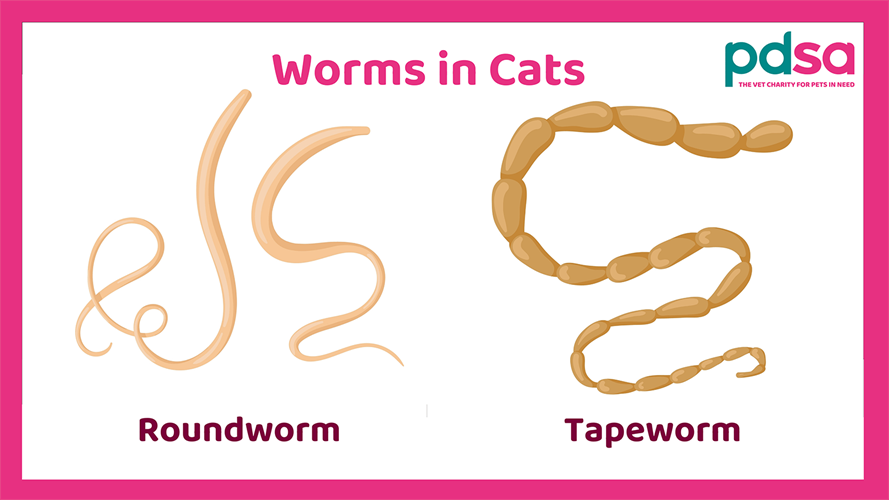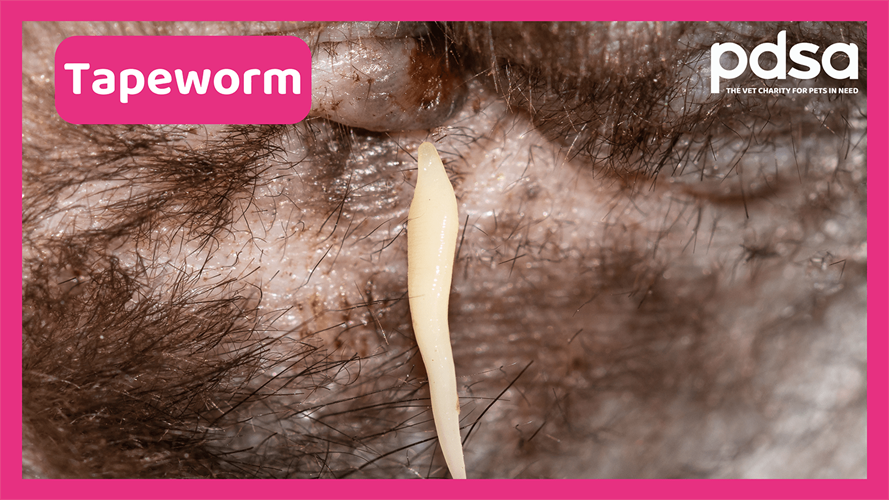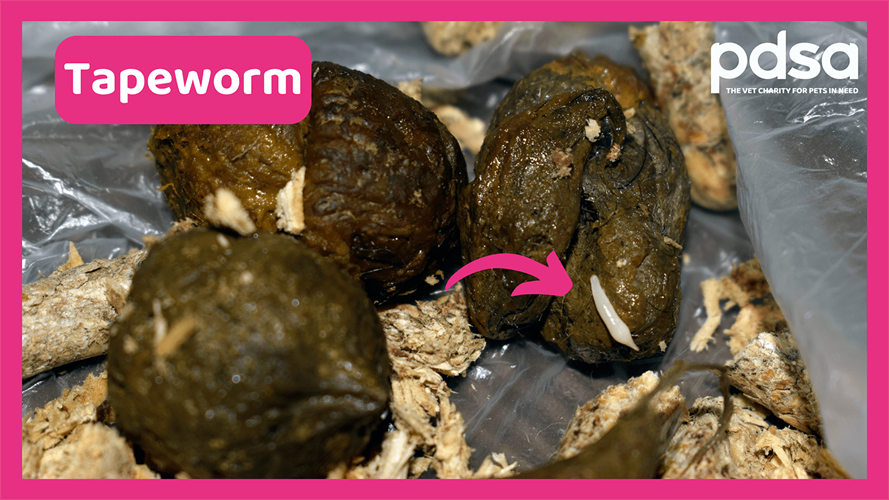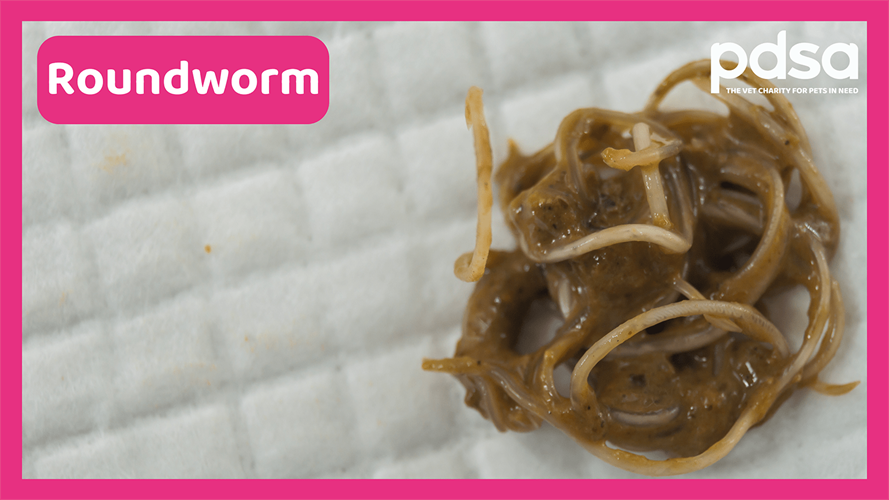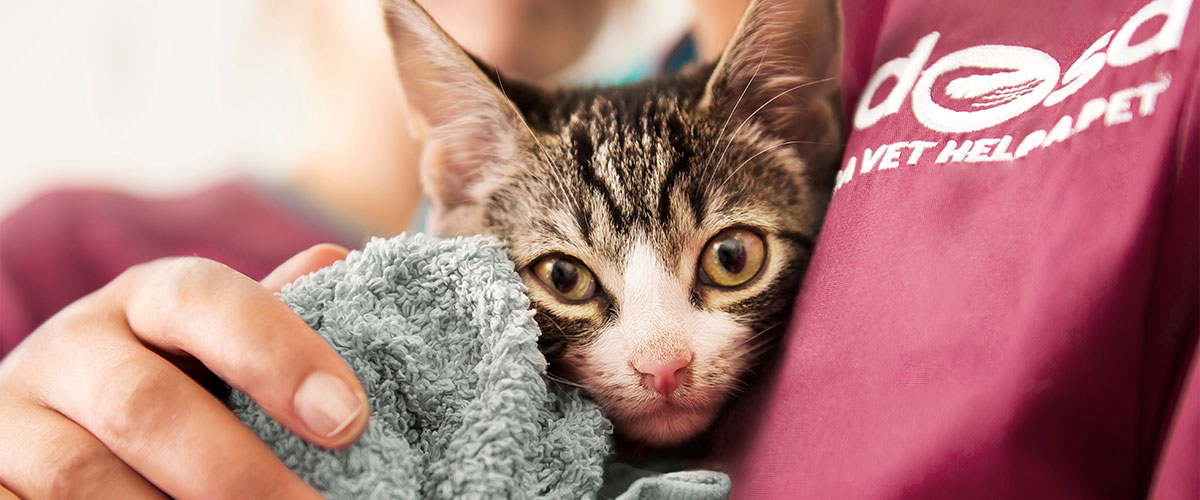Worms in cats
Overview
- Worms are a common problem for cats and, without regular treatment, most catch them at some point throughout their life.
- They live in the intestines, cause damage to the gut lining and steal food that the cat should be digesting. They rarely cause serious illness in adult cats but can make kittens very poorly.
- The best way to keep your cat worm free is to deworm them regularly.
 Video found at youtu.be/Wgl-cgufcwk
Video found at youtu.be/Wgl-cgufcwk
What type of worms do cats get?
Cats in the UK are at risk of picking up roundworm and tapeworm. These both live in the intestines (guts), cause damage to the gut lining, and steal the food the cat is meant to be digesting.
Roundworm
- Look like spaghetti/noodles
- Grow up to 15cm long
Tapeworm
- Look like flat ribbons made up of lots of little segments
- Grow up to 50cm long
- If your cat has tapeworms, you might see worm segments (which look like grains of rice) crawling around their bottom.
Worms rarely cause serious problems in adult cats, but they can cause serious dehydration, anaemia, gut blockages and even death in kittens.
Symptoms of worms in cats
Worms often cause symptoms such as:
- Weight loss
- Increased appetite
- Diarrhoea
- An itchy bottom
- Pot-belly and bloating (common in kittens with large numbers of worms)
Treating and preventing worms
Kittens
- You will need a worming treatment suitable for your kitten’s age and weight.
- Their first treatment should be at 3 weeks old and after that, they should be wormed every two weeks until they are 16 weeks old.
- After 16 weeks, they will need a treatment every three to six months, or as regularly as your vet suggests.
Adult cats
- A treatment every three to six months is usually enough to prevent worms from causing problems in adult cats.
- It may be necessary to deworm your cat slightly more regularly if they hunt a lot.
What to expect after treatment
- You may see dead worms in your cat’s poo if they had a very heavy infestation, but it’s more than likely that you won’t see anything after treating them.
- Contact your vet if your cat has diarrhoea or seems unwell after a worming tablet.
 Video found at youtu.be/D-R383L64LI
Video found at youtu.be/D-R383L64LI
Which is the best wormer for my cat?
There are many different worming products available for cats, including tablets, liquids, pastes and spot-on treatments. When choosing a wormer for your cat, make sure it treats for both tapeworm and roundworm, and you’ll be able to give it to your cat easily i.e. use a spot-on, liquid, or paste if they won’t let you give them a tablet.
Prescription wormers
- It’s best, wherever possible, to use a prescription worming treatment from your vet.
- If your cat is healthy and has seen your vet recently, your surgery will be able to dispense a worming treatment without needing to see them. They will just need to know how much they weigh so they can dispense the correct dose.
- If your cat hasn't been examined for a while, you’ll need to book an appointment.
Non-prescription wormers
- There are many different wormers available to buy without a prescription, and they vary a lot so it’s important to know the difference between them.
- Products that can be bought off the shelf without speaking to someone or answering questions about your cat, tend to be less reliable than ‘NFA-VPS’ products, which can only be sold by a specially qualified person, are stored in locked cupboards, and to buy one you’ll need to answer some questions about your cat, including their weight.
- Check out our video on ‘How to weigh your cat at home’.
Can humans catch worms?
It’s very rare for humans to catch worms from a cat, but it does occasionally happen. It’s most common in young children who have been playing in areas where cats have toileted. Cat’s worms can cause illness in humans by lodging in organs such as the eyes, liver, heart and brain. If you have concerns for yourself or someone else, it is best to contact your doctor or the NHS for advice. If you have small children, it is very important to deworm your cat regularly.
Published: Dec 2022
Did you find this page useful?
Tell us more
Please note, our vets and nurses are unable to respond to questions via this form. If you are concerned about your pet’s health, please contact your vet directly.
Thank you for your feedback
Want to hear more about PDSA and get pet care tips from our vet experts?
Sign up to our e-newsletter
Written by vets and vet nurses. This advice is for UK pets only. Illustrations by Samantha Elmhurst.

